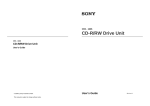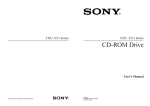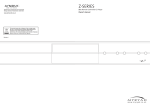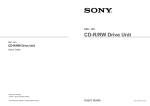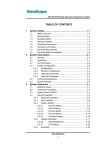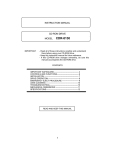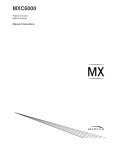Download Sony CDU625 User's Manual
Transcript
3-862-263-02(1) CDU625 CD-ROM Drive Unit CDU625 CD-ROM Drive Unit User’s Guide User’s Guide ©1997 by Sony Corporation Printed in Malaysia Owner’s Record The model and serial numbers are located on the top side of the drive. Record these numbers in the spaces provided below. Refer to them whenever you call upon your sales representative regarding this product. Model No. Serial No. WARNING To prevent fire or shock hazard, do not expose the unit to rain or moisture. To avoid electrical shock, do not open the cabinet. Refer servicing to qualified personnel only. This unit uses CD-ROM discs with the following mark. When you use this unit as an audio CD player, use compact discs with the following mark. CAUTION VORSICHT ADVARSEL ADVARSEL VARNING VARO! INVISIBLE LASER RADIATION WHEN OPEN. DO NOT STARE INTO BEAM OR VIEW DIRECTLY WITH OPTICAL INSTRUMENTS. UNSICHTBARE LASERSTRAHLUNG, WENN ABDECKUNG GEÖFFNET. NICHT IN DEN STRAHL BLICKEN, AUCH NICHT MIT OPTISCHEN INSTRUMENTEN. USYNLIG LASERSTRÅLING VED ÅBNING SE IKKE IND I STRÅLEN-HELLER IKKE MED OPTISKE INSTRUMENTER. USYNLIG LASERSTRÅLING NÅR DEKSEL ÅPNES. STIRR IKKE INN I STRÅLEN ELLER SE DIREKTE MED OPTISKE INSTRUMENTER. OSYNLIG LASERSTRÅLNING NÄR DENNA DEL ÄR ÖPPNAD. STIRRA EJ IN I STRÅLEN OCH BETRAKTA EJ STRALEN MED OPTISKA INSTRUMENT. AVATTAESSA OLET ALTTIINA NÄKYMÄTTÖMÄLLE LASERSÄTEILYLLE. ÄLÄ TUIJOTA SÄTEESEEN ÄLÄKÄ KATSO SITÄ OPTISEN LAITTEEN LÄPI. This label is located on the top of the drive. Dieser Aufkleber befindet sich an der Oberseite des Gehäuses. Caution- Use of controls or adjustments or performance of procedures other than those specified herein may result in hazardous radiation. Caution- The use of optical instruments with this product will increase eye hazard. 2 INFORMATION You are cautioned that any changes or modifications not expressly approved in this manual could void your warranty covering this equipment. Note: This equipment has been tested and found to comply with the limits for a Class B digital device, pursuant to Part 15 of the FCC Rules. These limits are designed to provide reasonable protection against harmful interference in a residential installation. This equipment generates, uses, and can radiate radio frequency energy and, if not installed and used in accordance with the instructions, may cause harmful interference to radio communications. However, there is no guarantee that interference will not occur in a particular installation. If this equipment does cause harmful interference to radio or television reception, which can be determined by turning the equipment off and on, the user is encouraged to try to correct the interference by one or more of the following measures: – Reorient or relocate the receiving antenna. – Increase the separation between the equipment and receiver. – Connect the equipment into an outlet on a circuit different from that to which the receiver is connected. – Consult the dealer or an experienced radio/TV technician for help. CLASS 1 LASER PRODUCT LASER KLASSE 1 PRODUKT LUOKAN 1 LASERLAITE KLASS 1 LASER APPARAT This CD-ROM Drive Unit is classified as a CLASS 1 LASER PRODUCT. The CLASS 1 LASER PRODUCT label is located on the top of the drive. Bei diesem CD-ROM-Laufwerk CDU625 handelt es sich um ein Laser-Produkt der Klasse 1. Ein entsprechender Aufkleber mit der Beschriftung LASER KLASSE 1 PRODUKT befindet sich auf der Oberseite des Geräts. Diese Ausrüstung erfüllt die Europäischen EMC-Bestimmungen für die Verwendung in folgender/folgenden Umgebung(en): • Wohngegenden • Gewerbegebiete • Leichtindustriegebiete (Diese Ausrüstung erfüllt die Bestimmungen der Norm EN55022, Klasse B.) 3 Trademarks • MS-DOS is a registered trademark of Microsoft Corporation. • IBM PC, PC/XT, and PC/AT are registered trademarks of International Business Machines Corporation. • HP Vectra is a registered trademark of the Hewlett-Packard Company. • Molex is a registered trademark of Molex, Inc. • AMP is a registered trademark of AMP, Inc. • 3M is a registered trademark of the Minnesota Mining and Manufacturing Company. • JAE is a registered trademark of Japan Aviation Electronics Industry, Ltd. 4 Contents Introduction 6 Features .............................................................................................. 6 Software Requirement ........................................................................ 7 Example of System Setup .................................................................. 7 Location and Function of Parts and Controls 8 Front Panel ......................................................................................... 8 Rear Panel .......................................................................................... 9 Precautions 10 Installing the Drive in Your Computer 11 Preparation ....................................................................................... 11 Setting the Jumpers .......................................................................... 11 Opening the Computer ..................................................................... 13 Preparing a Space for the Drive ....................................................... 14 Mounting the Drive ........................................................................... 15 Connecting the Drive ........................................................................ 15 Mounting the Host Adapter ............................................................... 18 Reassembling the Computer ............................................................ 19 Installing the Software Driver 20 Operating the Drive 21 Starting the Drive .............................................................................. 21 Ejecting the Disc ............................................................................... 23 How to Use the Disc Locks ............................................................... 24 Specifications 26 5 Introduction Features The CDU625 is an internal CD-ROM (Compact Disc Read-Only Memory) drive unit designed for use with an IBM PC, HP Vectra, or compatible computer. It can read as much as 540 Mbytes of digital data stored in a single CD-ROM disc. The CDU625 has the following features: General • • • • • 5 1/4 inch half-height drive form factor. Embedded SCSI bus interface (SCSI-2). 256-kbyte buffer memory on the SCSI controller. Audio CD like drawer loading of a disc without using a caddy. Power loading and power eject of a disc. The disc can also be ejected manually. • Housed in an airtight frame casing. • Equipped with a parity on/off switch. Supported disc format • Reads data in CD-ROM, CD-ROM XA, CD-I and CD-I Ready standard format discs, and from CD EXTRA disc. • Reads data in CD-BRIDGE format including PHOTO-CD. • Reads standard CD-Digital Audio encoded discs. Performance • Supports standard, quadruple, and 12 - 24× speed operations with real time error correction. • Fast access time ensuring reliable high-speed data access. Audio • Outputs 16-bit digital audio data over the SCSI interface. • Equipped with audio line output and headphones jack for audio CD playback. Note: The CDU625 is not equipped with an ADPCM audio circuitry required to support CD-ROM XA and CD-I compatible audio modes. In addition, the unit does not support the CD-I graphic decoding function; it has to be provided by the system. 6 Introduction Software Requirement To access data on CD-ROM discs, the appropriate device driver and MSCDEX (supplied with the host adapter) must be installed in your computer. See the manual that comes with the host adapter for details. The application software you need for using the data on a CD-ROM disc depends on the type and format of the target data. See the manual supplied with your CD-ROM disc for instructions. Example of System Setup To use the CDU625, at least the following components are necessary. • Computer (IBM PC, PC/XT, PC/AT, HP Vectra, or equivalent) • Host adapter • Floppy disk drive • Interface cable (50 pin flat cable) • Software (Device driver, Utilities) The following is an example of system setup. Software Host computer Floppy disk drive ID No.3 Host adapter ID No.7 CDU625 Audio cable Introduction 7 Location and Function of Parts and Controls Front Panel 1 2 3 4 5 6 1 Disc drawer Accepts a CD-ROM disc on its tray. 2 Headphones jack Accepts a stereo headphones set. Analog audio signals are output. 3 Volume contr ol Controls the volume level of sound output from the headphones jack 2. 4 Busy indicator This amber indicator lights or flashes to indicate one of the following unit conditions. • Steady lit: TOC (table of contents) read, seek data read, or audio playback in progress. • Flashing: Drawer in motion. 5 Emergency eject hole Used to open the disc drawer manually when neither the Eject button 6 nor a software command works. Insert a pointed object, such as a paper clip, into this hole and push (approx. 40 mm stroke). 6 Eject button Opens and closes the disc drawer. 8 Location and Function of Parts and Controls Rear Panel Pin 1 1 2 3 4 1 AUDIO OUT connector Outputs analog audio signals. 2 SCSI bus setting jumper block Specifies various SCSI bus settings. See page 12 for details. 3 interface CONNECT OR (SCSI b us) Connect to a SCSI host adapter using a connecting cable. 4 DC INPUT (power-in) connector Connect to the power supply of the host computer. Location and Function of Parts and Controls 9 Precautions ■ Installation • Avoid placing the drive in a location subject to: – high humidity – high temperature – excessive dust – mechanical vibration – direct sunlight • The drive can be used in either a horizontal or vertical position. • Do not force the power cable. It is keyed to protect the drive. ■ Operation • Do not move the drive when it is in use. Doing so may cause data error and damage the optical pick-up. • Avoid exposing the drive to sudden changes in temperature as condensation may form on the lens inside the drive. Should the surrounding temperature suddenly rise while the drive is turned on, stop using the drive and leave the power on at least one hour before operating it or turning it off. Operating the drive immediately after a sudden increase in temperature may result in a malfunction. ■ Transportation • Close the disc drawer before moving the drive. • Keep the original packing materials. When you need to ship the drive to another location, repacking it in its original container will help you transport it safely. 10 Precautions Installing the Drive in Your Computer This section provides the basic instructions you need to install the drive and host adapter in your computer. You should also read the manual of your computer for specifics of how to install internal devices. Preparation You need the following parts and tools (these are not supplied with the drive): • A flat-blade screwdriver • Four screws 3 mm in diameter (these should not protrude over 6.0 mm from the surface of the side panels or the bottom plate.) • Two mounting rails if your computer has mounting tracks. Unplug the computer and disconnect the cables attached to the back to give yourself more room to work. Do not turn on the power of the computer before completing the entire installation process. Setting the Jumpers Set the jumpers on the rear of the drive in accordance with the configuration of your computer system. PARITY PREVENT / ALLOW ID SELECT 1 2 3 TERM TEST MODE Installing the Drive in Your Computer 11 Removing the jumper from a jumper pin pair disables its corresponding function, and installing the jumper enables it. The recommended jumper for use is AMP Shunts (14227-1), JAE Short Socket (PS-2SH4-1) or equivalent. The following table shows the function of each pair of jumper pins. Jumper Function PARITY Enables/Disables the SCSI bus parity check function. ID SELECT Assigns the drive’s SCSI ID. Select an ID number which is not used by other SCSI devices connected to the bus. ID numbers and corresponding jumper pin setting are as follows: Jumper pin settings ID number 0 1 2 0 G G G 1 ® G G 2 G ® G 3 ® ® G 4 G G ® 5 ® G ® 6 G ® ® 7 ® ® ® G :Without jumper ® :With jumper :Factory setting TERM G :ACTIVE TERMINATOR OFF ® :ACTIVE TERMINATOR ON PREVENT/ ALLOW Enable: The disc drawer can be opened by pressing the eject button or by a software command. Disable: The disc drawer cannot be opened either by the eject button or a software command. TEST MODE Reserved for use at the factory only. Notes: • The upper row of pins are ground. • ID SELECT, PREVENT/ALLOW, and TEST MODE are recognized only when the power is turned on or SCSI is reset. • TEST MODE is reserved for use at the factory only. Do not put a jumper over TEST MODE pins. Doing so may cause an unexpected result. 12 Installing the Drive in Your Computer Opening the Computer 1 If your computer has its rear side covered by a plastic panel attached with plastic hook pad, pull it off. Computer Remove the plastic panel. Rear plastic panel 2 Remove the cover mounting screws. Cover mounting screw Remove the screws. 3 Remove the cover of the computer. Remove the computer cover. Installing the Drive in Your Computer 13 Preparing a Space for the Drive 1 Remove the screws and brackets securing the floppy disk drive and the lower drive bay blanking plate. Floppy disk drive Remove the screws and brackets. Lower drive bay blanking plate 2 Disconnect the floppy disk drive. Floppy disk drive 3 Remove the floppy disk drive and the blanking plate. Floppy disk drive Blanking plate 14 Installing the Drive in Your Computer Mounting the Drive If mounting rails are necessary, attach them to the drive in the same way as the ones on your floppy disk drive and slide the drive into the lower drive bay. Otherwise screw the drive in place. Slide the drive into the lower bay. Connecting the Drive Connect the drive to the computer with the following connectors: • DC INPUT connector • AUDIO OUT connector (if you plan to connect audio equipment) • INTERFACE CONNECTOR. INTERFACE CONNECTOR DC INPUT connector AUDIO OUT connector Installing the Drive in Your Computer 15 ■ DC INPUT connector The power supply cable recommended are those using an AMP 1-480424-0 housing and 170147-1 or 170120 contacts. The pin assignment is as follows. GND GND +12 V DC +5 V DC After matching the beveled edges, insert the plug of the power supply cable to the DC INPUT connector and push it firmly in place. Caution: Improper connection may damage the drive and void the warranty. DC INPUT connector Power supply cable (4-pin connection cable) ■ AUDIO OUT connector The audio output cable recommended are those using a Molex 08-50-0113 or 08-50-4114 contacts and a 22-01-3047 housing. The pin assignment is as follows: GND Right signal 16 Installing the Drive in Your Computer GND Light signal ■ INTERFACE CONNECTOR 1 Firmly insert one end of the interface cable into the INTERFACE CONNECTOR. Pin 1 INTERFACE CONNECTOR Interface cable 2 Attach the other end of the cable to the host adapter. Host adapter Interface cable Installing the Drive in Your Computer 17 Mounting the Host Adapter Install the host adapter in one of the available system expansion slots of your computer. Refer to the operating instructions included with the host adapter for complete instructions on installation and settings. Install the host adapter in one of hte expansion slots. 18 Installing the Drive in Your Computer Reassembling the Computer 1 Reinstall the floppy disk drive in the top drive bay. Reinstall the floppy disk drive. 2 Reconnect the cables to the floppy disk drive. 3 Fasten the screws and front brackets as they were before. 4 Tuck the cables behind the drives so that they do not protrude above the power supply module. Tuck the cables. Power supply 5 After checking the following points, slide the computer’s cover on and fasten the cover mounting screws at the back of the computer. • Are the connections between the drive and computer correct? • Are the jumpers set to the appropriate positions? 6 Remount the rear plastic panel, if any. Installing the Drive in Your Computer 19 Installing the Software Driver The MSCDEX (or equivalent) and a device driver for the CD-ROM drive are supplied with the host adapter. Install both the MSCDEX (or equivalent) and the device driver in order to use the CD-ROM drive. Refer to the manual supplied with the host adapter for instructions. 20 Installing the Software Driver Operating the Drive This section describes how to start the drive and eject a disc. Starting the Drive 1 Turn on the power of your computer. 2 Press the eject button. The drawer comes out automatically. Press the eject button. 3 Place a disc in the drawer with its label side up. Place a disc with its label side up. Operating the Drive 21 Note: When the drive is set up in vertical position, use the disc locks to prevent your disc from falling. See “How to Use the Disc Locks” on page 24 for details. Disc locks 4 Gently push the drawer or press the eject button to close the drawer. The drive may begin reading the Table of Contents (TOC) data when it accepts the disc. The busy indicator lights up in amber while the drive is reading the TOC. For subsequent drive operations, follow the instructions provided with the application software you are using. Note: The busy indicator stays lit in amber if: – the disc is not properly placed on the loading tray – a malfunction occurs. In either case, eject the disc and place it in the loading tray again making sure that it sits properly in the tray. If doing this does not solve the problem and the busy indicator still remains lit in amber, consult your dealer or qualified service personnel. Caution: Do not forcibly close the disc drawer. Applying excessive force may damage the loading mechanism. The tray’s mechanism is designed to operate with a “feather touch”. 22 Operating the Drive Ejecting the Disc To eject the disc, press the eject button on the front panel. The drawer comes out automatically. Press the eject button. Note: The eject button does not work if it is disabled by: – the software you are using – the PREVENT/ALLOW jumper. ■ Opening the drawer manually in an emergency You can open the drawer manually when it fails to come out by means of the eject button or software commands. To do this, follow the procedure below: 1 Turn off the power of your computer. 2 Insert a pointed object, such as a paper clip, into the emergency eject hole and push. Insert a pointed object to the emargency eject hole. Approx. 40 mm After removing a disc from the drive unit, consult your dealer or qualified service personnel. Operating the Drive 23 How to Use the Disc Locks The disc tray has four disc locks that prevent the disc from falling when the drive is set up in vertical position. Disc locks Note: When the drive is used in horizontal position, you do not need to lock the disc. ■ Locking and unlocking All of the four locks are set in the unlocked position (facing outward) when the drive is shipped from the factory. To set the lock in the locked position, turn it with your fingers until you hear a click so that it faces inward. locked to unlock 24 Operating the Drive unlocked to lock When the drive’s right side is down To facilitate disc handling, set the disc locks B, C and D into the locked position, and leave the disc lock A in the unlocked position. A D Top side Right side B C When the drive’s left side is down To facilitate disc handling, set the disc locks A, C and D into the locked position, and leave the disc lock B in the unlocked position. C B Top side Left side D A Operating the Drive 25 Specifications ■ General Host interface Disc Acceptable discs Rotational speed Innermost track Outermost track SCSI-2 CD-Digital Audio discs CD-ROM mode-1 data discs CD-ROM mode-2 data discs CD-ROM XA discs (readable) Audio-combined CD-ROM discs CD-I discs (readable) CD-I Ready discs (readable) CD Bridge discs Photo CD discs (single and multi session) 530 min-1 (530 rpm/normal) 2120 min-1 (2120 rpm/quadruple) 6360 min-1 (6360 rpm/maximum) 200 min-1 (200 rpm/normal) 800 min-1 (800 rpm/quadruple) 4800 min-1 (4800 rpm/maximum) ■ Drive performance Data transfer rate Sustained rate Burst rate Access time Random 150 kbytes/s (×1 mode) 600 kbytes/s (×4 mode) 3600 kbytes/s (P-CAV mode) 5 Mbytes/s (asynchronous) 20 Mbytes/s (synchronous) 90 ms (typical, P-CAV mode) ■ Reliability Read error rate (includes retry, with a standard disc) L-EC on 1 block /10l2 bits L-EC off 1 block /109 bits ■ Audio Output level Line out Headphone 26 Specifications 0.75 V at 47 kΩ 0.55 V at 32 Ω ■ Environmental conditions Operating Temperature Humidity Atmosphere 5 °C to 50 °C (41 °F to 122 °F) 10 % to 90 % (Max wet bulb 29 °C) Non-condensing ■ Dimensions and mass Dimensions Mass 146 × 41.4 × 208 mm (w/h/d) (5 3/4 × 1 11/16 × 8 1/4 inches) 0.84 kg (2 lb 3 oz) ■ Power requirement Voltage Ripple Current Seek +5 V ± 5 % DC and +12 V ± 10 % DC +5 V DC: 100 mVp-p +12 V DC: 200 mVp-p +12 V DC: 1.8 A (typ) + 5 V DC: 1.3 A (typ) ■ Connectors INTERFACE CONNECTOR (with DC INPUT connector) AMP 179376-1 or equivalent AUDIO OUT connector Molex 70553G or equivalent ■ Laser Wave length Output power 780 nm 0.3 mW Design and specifications are subject to change without notice. Specifications 27 ■ Dimension diagram Important: The overhang of the screws should not exceed 6.0 mm from the surface of the side panels or the bottom plate. 146 (5 3/4) 148 (57/8) 203 (8) 5 (7/32) 42.3 0.5 (1/32) (111/16) 139.7 (51/2) + + Specifications + + 4-M3 mounting screws 28 79.25 (31 /8 ) 41.4 (111/16) 21.9(7/8) 10 (13/32) 0.4 (1/32) 4-M3 mounting screws (4 on each side) 47.5 (17/8)




























